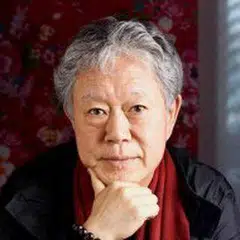Taiwanese art historian: Why a mother's winter melon soup is best
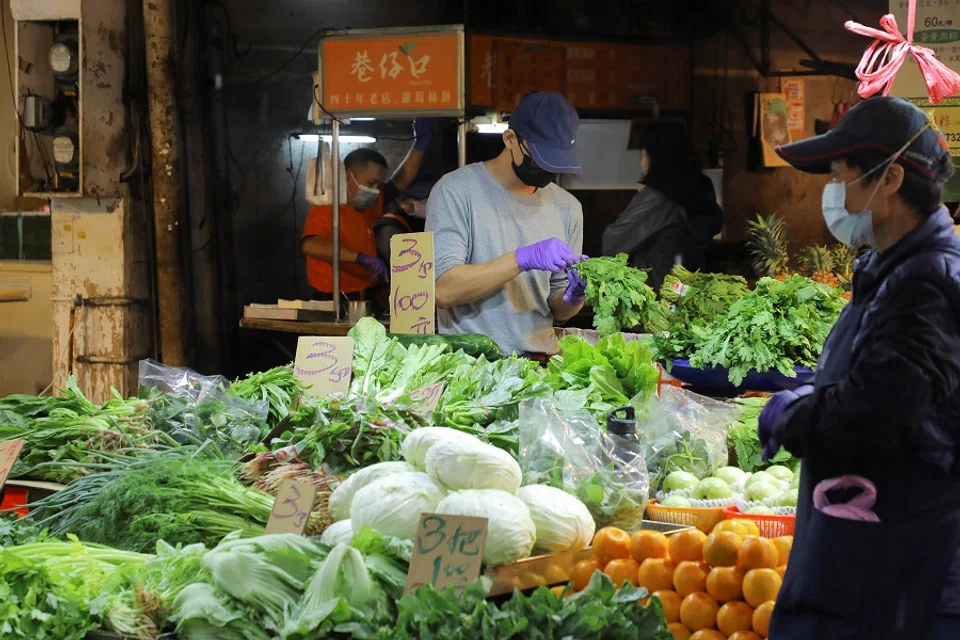
A friend gave me a chestnut pumpkin which resembled a giant peach. Its green skin had a mercurial glow, much like Han dynasty green-glazed pottery shimmering in its quiet beauty. It sat on my desk for a while as I couldn't bear to eat it. But I also started thinking, "If Mother had this pumpkin, how would she cook it?"
I've seen Mother making double-boiled winter melon soup before and even went with her to the market to get the perfect winter melon. She would stand there for a long time until she found a small winter melon about 20 cm in diametre. When she cut it open at home, the flesh would be thick and glistening like white jade, emanating the coolness of a mountain spring in summer.
Later on, I had the opportunity to try double-boiled winter melon soups in big restaurants... But I always found it a pity that such renditions have lost the mild flavour of winter melon.
Simple and simply delicious
Mother's double-boiled winter melon soup is made with shiitake mushrooms, black fungus, pine mushrooms and dried bamboo shoots simmered in chicken broth, dried scallops that have been rehydrated, ham, and dried cuttlefish. The ingredients are mainly vegetarian; the little meat in there is just to add extra flavour.
She would turn down the fire once the soup came to a boil and leave it to simmer on low heat; even when she turned off the fire, she would leave the pot on the stove for a while to let the winter melon soak up the broth. When it was time to eat, the winter melon soup was refreshing, light and clean, with a lingering aftertaste.
Later on, I had the opportunity to try double-boiled winter melon soups in big restaurants - those topped to the brim with abalone, fish maw, tendon and other expensive ingredients. But I always found it a pity that such renditions have lost the mild flavour of winter melon.
Sticking to one's true essence is not easy to achieve. Maybe it is about playing one's own role well, and not yielding to greed or deviating from the course.
It was hard to be flighty after surviving war and chaos. One would naturally be grounded and simple.
Mother's bold-flavoured dishes were a reflection of her steadfastness amid tumultuous times of war and earnest prayers for peace for all sentient beings. Having drifted around all her life, Mother's cooking was not tied to a particular place.
She was from the north and made exceptional noodle dishes, from gnocchi-like dumplings to qihua mian (旗花面, colourful triangle-shaped noodles), regular dumplings and buns. She could also cook Father's Fujian hometown specialties and brew her own liquor. She knew how to save the wine lees and coat them like breadcrumbs over swamp eels before steaming or deep-frying them. The wine lees would also be used to make chicken stew.
Stir-fried pork kidneys with dough fritters, a Fujian delicacy, is extremely laborious to make; cleaning and preparing the pork kidney alone takes a lot of effort. Not only must the urinary lining be completely removed, the kidney is also rubbed with flour to get rid of the foul organ smell. Then a big knife is used to thinly slice the kidneys, before seasoning, frying and adding the crispy overnight dough fritters. This notable Fujian dish was also one of Mother's specialties.
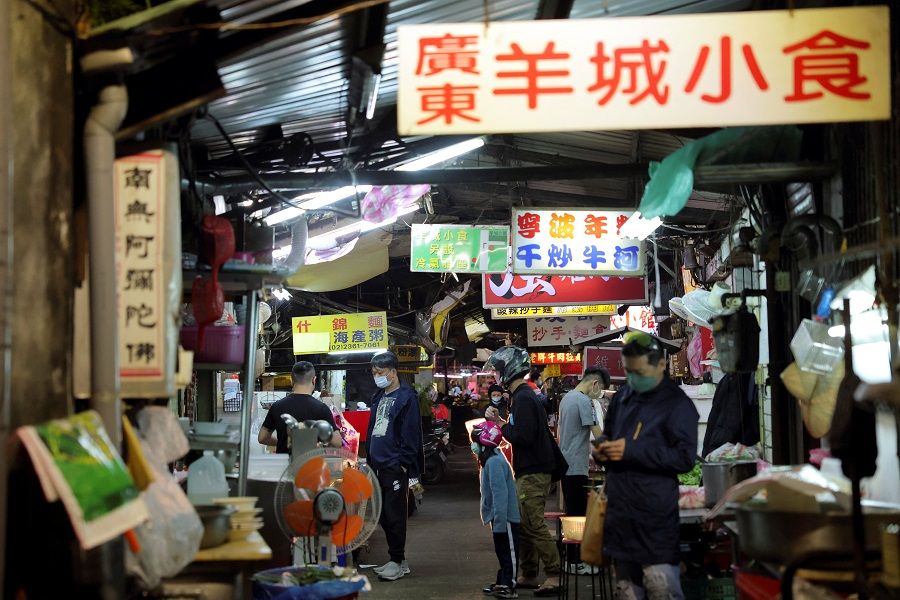
When Mother finally settled down in Dalongdong, she learnt to make the Tong'an (同安) people's rice pudding and sticky rice. During the Chinese New Year, she would grind rice and make rice cakes with our neighbours.
It was hard to be flighty after surviving war and chaos. One would naturally be grounded and simple.
Each of these different fuels has their own characteristics and creates different flavours in food.
All about fire control
When cooking with fire, it all boils down to heat control. Steaming, boiling, pan-frying, simmering, stewing, baking, grilling, roasting, deep-frying, sautéing, stir-frying, braising and blanching are all about heat control.
Heat control is about one's understanding of fire. Big, small, quick or slow, it is all measured.
Fire either originated from Suirenshi (燧人氏) or Prometheus, who stole it from the gods in Greek mythology. Gathered around a fire, people counted the twinkling stars and waited for the dawn. Ten thousand years later, people still hope that the flame will be passed from generation to generation and never die.
Mother's vast experience on the uses of fire could almost be written into a history textbook. During wartime, she witnessed gunfire and smoke. Perhaps that's why she was able to appreciate the joy of sitting quietly by the fire of a furnace.
Whenever she cooked, she would use firewood to start a fire and also charcoal, charcoal briquettes, imported oil, gas, electricity, induction and so on.
Each of these different fuels has their own characteristics and creates different flavours in food.
Perhaps the furnace fire reminded her of an air raid from long ago with its surging flames illuminating the sky, and other horrific scenes and haunting cries. But she remained focused, praying that the fire before her would grant a lifetime of peace and security.
If we have no patience for fire, we will also find it difficult to understand forbearance in life's torments and sufferings (煎熬, jian'ao - jian also means "to pan-fry", while ao also means "to simmer").
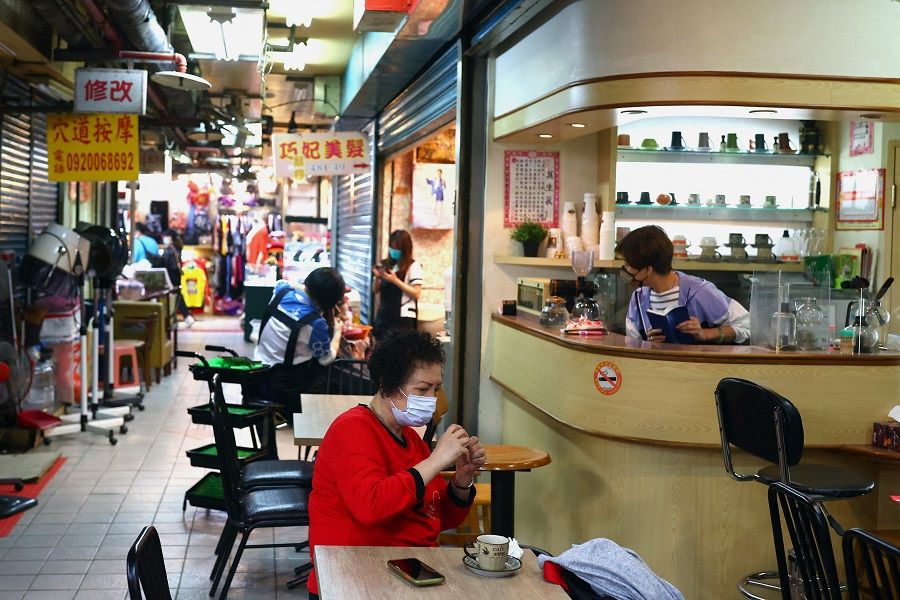
A slow roast, a gentle simmer, a pan-fry or a boil are all skills to be learnt. Cooking is all about mastering heat control, but so is life.
Most people today do not know about roasting (煨 wei) at low temperatures, and neither do they know about snuggling up to another (依偎 yiwei) - it may take a while to warm up, but that warmth is lasting. If we understand roasting and braising, we will also learn patience and the value of things that take time to bear fruit.
Learning patience and fortitude
If we have no patience for fire, we will also find it difficult to understand forbearance in life's torments and sufferings (煎熬, jian'ao - jian also means "to pan-fry", while ao also means "to simmer").
I seldom eat dry-fried green beans (干煸四季豆) at restaurants anymore, because dry-frying takes time. It is not stir-frying and neither is it deep-frying. It doesn't use oil but uses low heat to produce moisture, which also takes time. If you're always in a hurry, it would be difficult to understand what dry-frying means.
In my childhood, you had to wait if you wanted to use fire or water.
We have now taken for granted that water - both hot and cold - comes to us the moment we turn on the tap.
But this was not the case during my childhood. We had to draw water from the streams or the well, and boil it after we're back home. It was a very long process.
I recently came across a well pump along the river, and looked at it for a long time. I guess the younger generation wouldn't know what a well pump is. Well pumps were used to transport water up from an underground well. By pushing the lever (the lever of the well pump in the image below is broken) on the outside of the pump up and down, water would gush out from the spout on the other side.
Such installations were common in my childhood. The women would gather around the well pump and either wash vegetables or clothes, or exchange gossip. Sometimes, people would fight over water at the well pump, pulling each other's hair out.
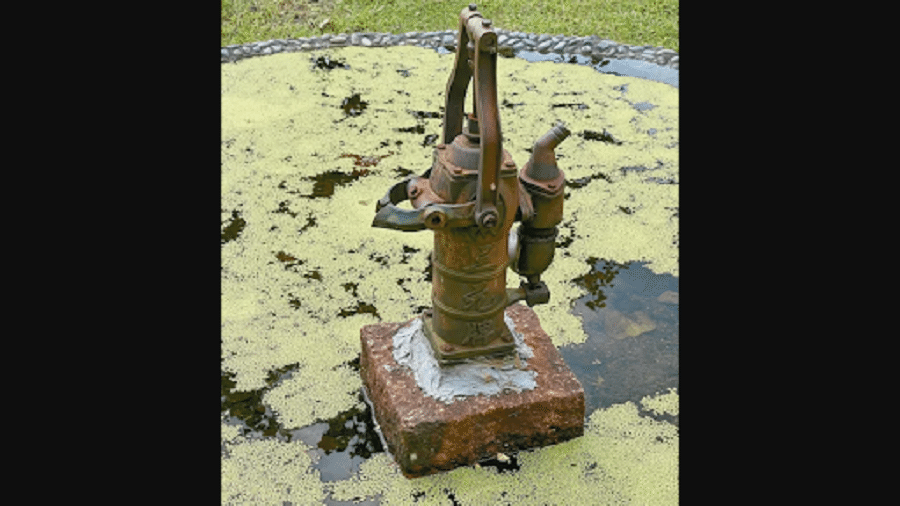
The well pump was shared by the community and it is certainly not as convenient as the taps in every household today. I count myself lucky to have lived in an era when taps were not available to each household for the first ten years of my life. That is why I still feel that it is a miracle to see water gushing out each time I turn on the tap even until today, and my heart is filled with gratitude.
Today, filtered drinking water or hot water immediately flows out of the tap when you turn it on. With water easily accessible, people no longer think that it is a miracle and neither do they feel a need to be grateful for it. When there's water, people feel that that's the way it should be, and when there's no water, people raise a ruckus.
I am thankful for the times we didn't have much because it taught me to be grateful for what I have. I was thus able to stay focused and not indulge in wishful thinking.
Indeed, with the strides in technology, we can now do many things with machines. I'm grateful because from having nothing as a kid, we now have household equipment like an electric fan, a gramophone, a television, a gas stove, an electric cooker, a refrigerator, a telephone and an air conditioner. We even have the metro to move around in and can take the aeroplane to any destination.
Not taking things for granted
The invention of each and every machine felt like a miracle, filling my heart with joy and excitement each time.
Yet, about half a century ago, an energy crisis emerged. Now, energy resources are running out, the environment is polluted by carbon emissions, the ozone layer is depleting, the North and South poles are melting, forests are burning, many plants and animals are at risk of extinction, drinking water is contaminated by plastic particles...
I have celebrated miracles but have also seen miracles go unappreciated. Mankind has lost its sense of duty and has no restraint. Miracles have turned into curses, as if the Old Testament has already predicted it all, from the genesis of the world to the destruction of Sodom.

The Five Elements (Wood, Fire, Earth, Metal and Water) surrounding our lives are changing constantly - sometimes quickly and other times slowly. Perhaps, humans still stand at the core. If a person loses sight of his/her mission, the movement and interaction of the Five Elements will fail to give him/her strength but will become a hindrance instead.
After the second industrial revolution, traditional manual labour could be replaced by machines. Perhaps, now that a century has passed, humanity will slowly realise that the miracles of that industrial revolution are turning into curses one at a time.
In the post-industrial era, how are we to resolve the global issues left behind by rapid industrial consumption?
I was grateful for each and every technological miracle that happened in my life, even until mobile phones and computers arrived. But I have also started to deeply ponder and reflect. Looking at all the household necessities - refrigerator, television, computer, washing machine, microwave, air conditioner, dehumidifier, air purifier, electric floor sweeper - I ask myself: "Do I need all of them? Are they all necessary?"
I need another type of miracle to return to a plain and simple life - not by addition but by subtraction.
I often study I Ching's (《易经》) Sun hexagram (损卦, symbol of decrease) and Yi hexagram (益卦, symbol of gain). What can I further "decrease" from my life?
Going back to the beginning, perhaps it is time to return to one's own purpose.
This article was first published in Chinese on United Daily News as "五行 九宮 蔬食3".
Related: Life and life lessons in the old markets of Taiwan | Taiwanese art historian: The five elements of cooking in the olden days | Taiwanese art historian: How should I meet my mother in the afterlife - as a child, an adult or an old man? | Taiwanese art historian: My mother waited for her soldier husband to return from war, just like Wang Baochuan | What I Ching and the mangrove tree flowers tell us about life
